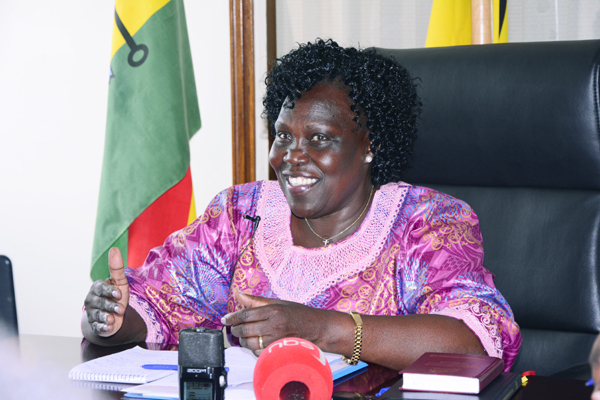
Kampala, Uganda | THE INDEPENDENT | The Leader of Opposition in Parliament, Betty Aol Ocan has asked the Budget Committee to approve her proposal for a special audit of the Consolidated Fund.
She says the special audit should be undertaken with the “purpose of ascertaining the extent of unspent balances, how they arise, ought to be budgeted for and utilized”. She made the appeal while presenting her response to the 2020/2021 financial year National Budget Framework Paper.
The Public Finance Management Act, 2015 provides that a vote that doesn’t spend money that was appropriated to it within that financial year must return it to the Consolidated Fund as at 30 June. According to Ocan, by the end of the 2018/2019 financial year, a total of Shillings 828.8 billion was returned to the Consolidated Fund as unspent balances.
Among the votes that returned funds were Treasury operations (Shs 414 bn), Defense ministry (Shs 69bn), Uganda Police Force ( Shs 59.2bn), Office of the President (Shs 54.4 bn) and Makerere University (Shs 40bn). Others included NAADS Secretariat (Shs 39.9 bn), Parliamentary Commission (Shs 26.9bn), Lands ministry (Shs 39.2bn) and Uganda Prisons (Shs 31.2bn).
Ocan noted that “surprisingly the votes with the highest unspent balances are regular beneficiaries of supplementary budgets” and that it points to the fact that “such votes didn’t require the supplementary budgets”. As a result, Ocan argues that the Finance Ministry should improve on its scrutiny of supplementary requests, adding that the budget committee should support her proposal for a special audit of the Consolidated Fund in relation to unspent balances.
She justified the need for the special audit because it is unclear how unspent balances of the previous financial year are incorporated into financing a budget of the next financial year. “This leads to underestimating the available resource envelope for a given year,” Ocan said. “Ideally, the unspent balances of previous financial year ought to be incorporated into the resource envelope of the following financial year,” she added.
In 2017/2018, Shillings 22.4 billion was unspent out of the approved budget of Shillings 29 trillion. Ocan told Uganda Radio Network-URN that MPs need to be more critical and must demand for accountability for all appropriated public funds.
The Budget Committee Vice Chairperson, Patrick Isiagi supported the proposal, saying there should be a mechanism to establish how the returned money should be incorporated during the budget process for the next financial year.
Anne Maria Nankabirwa, the Kyankwanzi Woman MP also supported the proposal as a means to curb corruption and ensure that Parliament appropriates funds to votes depending on their last absorption capacity. She commended Aol for highlighting the matter and that the budget committee will take interest in getting answers from the ministry of finance.
Last July, the Office of the Accountant General released a preliminary report showing that ministries, departments, and local governments had failed to spend Shillings 349.7 billion out of the Shillings 33.3 trillion in the 2018/19 financial year. The ministries, departments, and agencies failed to spend Shillings 210 billion while local government failed to absorb Shillings 139.5 billion.
Lawrence Ssemakula, the Accountant General told Uganda Radio Network-URN that most of the entities failed to absorb funds due to failure to verify pension claimants and pay wages for positions that had not been filled by end of the financial year.
He said that the unspent funds cannot easily be proposed for allocation in the budget for the next financial year, a proposal MPs and civil society organizations have been pushing for severally. Ocan says that when funds are not spent on the planned for activities, it affects service delivery among other effects.
She also notes that most budget committee members were supporting her proposals because they were tired and are constrained by time to make critical observations during the processing of the NBFP.
******
URN
 The Independent Uganda: You get the Truth we Pay the Price
The Independent Uganda: You get the Truth we Pay the Price



